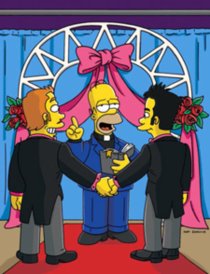 Brad Pitt, Russell Crowe, Gerard Butler, Andy Whitfield, the list goes on: all muscular fellows who got down and dirty in leather thongs and strappy sandals. With the Clash of the Titans remake set to launch Sam Worthington onto the big screen in yet more oiled-up action, and Starz’s Spartacus: Blood and Sand ramping it up with some gay thrills (and quite a bit of full frontal male nudity), we ask just how gay were the real ancients? The answer is -- a whole lot more than the movies show.
Brad Pitt, Russell Crowe, Gerard Butler, Andy Whitfield, the list goes on: all muscular fellows who got down and dirty in leather thongs and strappy sandals. With the Clash of the Titans remake set to launch Sam Worthington onto the big screen in yet more oiled-up action, and Starz’s Spartacus: Blood and Sand ramping it up with some gay thrills (and quite a bit of full frontal male nudity), we ask just how gay were the real ancients? The answer is -- a whole lot more than the movies show. Spartacus
SpartacusIn contrast to most of the stories that follow, the ’60s movie is pretty gay, the TV series is very gay, but the real-life story wasn’t really gay at all. Spartacus was one of a group of slaves who fought their way out of a gladiator school in Italy in 73 B.C. He proved smart and scored victories over every Roman army sent after him, and his own ragtag army grew to number tens of thousands. Finally, the might of Rome prevailed and Spartacus was defeated, his followers killed or crucified. His body was never found. There are no reports of gayness. On to Stanley Kubrick’s 1960 movie, Spartacus, with Kirk Douglas in the title role, but the much more interesting subplot featuring the very camp Crassus (Laurence Olivier) lusting after a very young, pretty slave boy Antoninus (Tony Curtis) and making his play in the baths. That scene was not restored until the movie’s re-release in 1991. Now we have the TV show, which is really 300 meets Gladiator meets The Matrix with some man-on-man action. No, really -- and this time not just innuendo. It isn’t a major plotline, but there is a serious relationship there, with a muscled hunk and a … whatever twinks were called in those days. Twancients?
The Sacred Band of Thebes
One hundred-fifty homo couples, idolized by society, heroes to all, sworn to fight to the death to protect their love and homeland. Perfect. And for 40 years (from 378 B.C.) they did just that for the Greek city-state of Thebes. They were instrumental in defeating the Spartans (mild irony here, given those scantily clad brutes’ fondness for pederasty), and then (major irony this time) were wiped out by none other than Alexander (soon to be “the Great” and very likely “the Gay”) and his dad, Philip of Macedon, in 338 B.C. The Band were the only ones not to run away and refused surrender. Philip, seeing the bodies, is said by Plutarch to have stated: “Perish any man who suspects that these men either did or suffered anything unseemly.”
By chance, that very battle is re-created in the 1956 Richard Burton film Alexander the Great, though sadly it makes no mention of the Band at all and is in fact completely lame-looking other than Burton, who’s always worth a look.
 Alexander the Great
Alexander the GreatWas he or wasn’t he? Gay, that is -- clearly he was great, having conquered one of the largest empires in history by the time of his death at 32 (in 232 B.C.). But despite his two marriages and his harem (a Persian affectation he favored though apparently used “sparingly”) and the arguments between biographers and historians, most agree his greatest relationship was with Hephaestion, his bodyguard, general, and companion. Hephaestion’s death plunged Alexander into a deep depression, and he died just eight months later. So was he gay? Maybe not, but the boy was very, very bi. Colin Farrell, in the movie Alexander, went for a pretty queer blond hairdo, but that’s as gay as the film got -- which is probably why the movie bombed.
And for purists, see Richard Burton in the 1956 movie Alexander, under our previous the Sacred Band of Thebes entry.
The Spartans
Bullies, brutes, preening peacocks, and big fans of oiling up and doing each other’s hair before a battle. The Spartans were all that and more and for a long time, given how much they really annoyed pretty much everyone they met (Sparta was a major power from 650 B.C. until around 360 B.C.). A brief summation of Spartan society: two kings, a small council of old men (the Gerousia), a small number of citizens, and a huge number of slaves (helots) to bully, humiliate, abuse, and kill. The male citizens were full-time soldiers and enjoyed pederasty, where an older man took a younger man under his wing. Some historians say this was chaste, some say chaste and yet erotic, some say get a grip, of course it was sexual. Also, when a young soldier came of age, his pre-chosen wife had her head shaved and was wrapped in a woolen military cloak and made to lie in a darkened room for him. Pretty conclusive, no? The movie 300 managed to simultaneously be really gay and pretty homophobic, what with the Athenians dismissed as “boy lovers” and that huge Persian drag god-king. Still, if it’s oiled six-packs and leather thongs you’re after, look no further. And don’t think of Gerard Butler as he is now, captured recently post-swim by a paparrazi, in all his bloated glory. Think of him always with a stomach like a carton of eggs, shouting “THUS. US. SPARTA!” in a Glaswegian accent.
Bullies, brutes, preening peacocks, and big fans of oiling up and doing each other’s hair before a battle. The Spartans were all that and more and for a long time, given how much they really annoyed pretty much everyone they met (Sparta was a major power from 650 B.C. until around 360 B.C.). A brief summation of Spartan society: two kings, a small council of old men (the Gerousia), a small number of citizens, and a huge number of slaves (helots) to bully, humiliate, abuse, and kill. The male citizens were full-time soldiers and enjoyed pederasty, where an older man took a younger man under his wing. Some historians say this was chaste, some say chaste and yet erotic, some say get a grip, of course it was sexual. Also, when a young soldier came of age, his pre-chosen wife had her head shaved and was wrapped in a woolen military cloak and made to lie in a darkened room for him. Pretty conclusive, no? The movie 300 managed to simultaneously be really gay and pretty homophobic, what with the Athenians dismissed as “boy lovers” and that huge Persian drag god-king. Still, if it’s oiled six-packs and leather thongs you’re after, look no further. And don’t think of Gerard Butler as he is now, captured recently post-swim by a paparrazi, in all his bloated glory. Think of him always with a stomach like a carton of eggs, shouting “THUS. US. SPARTA!” in a Glaswegian accent.
 Clash of the Titans
Clash of the TitansThis is Greek god territory, and not many people would still claim they were real, so it’s fair game for reinvention in the movies. And as a genre, Greco-Roman mythology has no shortage of same-sex relationships -- Hercules perhaps the best-known and reputed to be the lover of many, many women and not a few boys.
As for the movies, the original Clash of the Titans sucked and not in a good way. The remake though, well: Sam Worthington in a tiny leather kilt and shaved head, plus a band of brawny companions in red cloaks and not much else. Liam Neeson too, though he’s gotten old and keeps his clothes on, thankfully. Can there be such a thing as too many dirty sweaty Greeks with great bods? Don’t be silly.
The Trojans

You know you’re manly when a brand of condoms is named after you, right?
So if we pretend we believe the siege of Troy really happened the way the legends tell us (Helen, face that launched a thousand ships; wooden horse; Achilles and his heel; etc.) then we’re mining a historically queer vein here. Achilles himself and Patroclus were very close, though no one specifically says they were bedding down together, but in context, pederasty seems highly likely. Achilles’ homo tendencies are again to the fore when the Trojan prince Troilus and his sister Polyxena are captured and Achilles takes a fancy to the lad. In different versions of the tale, Troilus rejects Achilles and is decapitated (you’d think twice before rejecting Achilles, clearly) or they get it on and Troilus is killed in an overenthusiastic clinch with Achilles. If only to show how un-gay the 2004 movie Troy, is in comparison to the legend: We have Brad in sandals and a tiny skirt with lots of muscles but the movie stresses that the pair are cousins (in fact, they’re first cousins once removed), and this is stressed with much manly sporting around, so we know there couldn’t be anything dodgy going on.
The Roman Emperors
Forget Caligula and Nero and their excesses: Those dudes would have humped a doorknob. The real, honest-to-goodness gay emperor also one of the best emperors: Hadrian (emperor from 117 A.D. until 138 A.D.), who was one of the so-called “five good emperors.” He strengthened the empire, wrote poetry in Latin and Greek, and made the beard fashionable (his may well have been grown to hide a warty face, but never mind). He also built libraries, bathhouses (of course) and theaters. Is any more proof needed? Well, here it is, in the handsome shape of Antinous, a Greek boy who Hadrian met when the youth was 13 or 14. When the boy mysteriously drowned six years later, the grief-stricken emperor founded a city in his honor and then had him deified.
But back to Caligula for a second, and high praise for a classic moment in TV history, courtesy of the Brits’ cheap and cheerful 1970s TV series I Claudius. There’s no suggestion Claudius was a homo, but check out this wonderful scene where the young Caligula (John Hurt at his creepiest) presents his Uncle Tiberius with ancient gay porn … and a special appearance by Patrick Stewart (with hair) as Praetorian Guard commander Sejanus.
 Gladiator
GladiatorWe love an excuse to show Russell Crowe at his sweaty best, and here it is. He fights Commodus (Joaquin Phoenix) in the arena at the end of the movie, you may recall. Commodus’ character is based on the real-life emperor of the same name (who ruled 180 A.D. to 192 A.D.). The real Commodus was a thug who loved a fight and used to battle men and animals in the arena, often naked in his preferred guise of the famously bi-curious Hercules.
Article from: Out Magazine










No comments:
Post a Comment